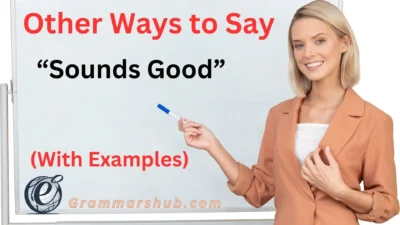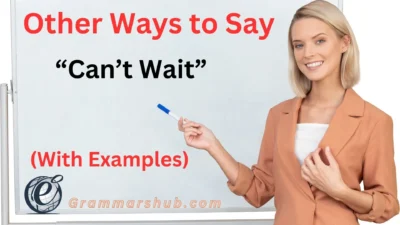Expressing gratitude is powerful. Sometimes, a simple “thank you” feels insufficient to convey how much we appreciate someone’s actions, kindness, or support. Choosing the right words can add warmth and sincerity to any message, making it feel even more personal and meaningful. This article provides 30 alternatives for “thank you,” each with its own unique tone and best use, so you can find the perfect way to show appreciation in any setting.
What Does “Thank You” Mean?
Definition: “Thank you” is an expression used to show gratitude and acknowledgment for something another person has done. It signifies recognition, respect, and appreciation toward someone’s actions or words.
At its core, “thank you” reflects an awareness of kindness, support, or effort shown by others. Saying “thank you” not only conveys appreciation but also builds goodwill, fosters connections, and encourages positive interactions. This simple phrase has become a universal token of appreciation, essential in both personal and professional exchanges.
Is It Professional or Polite to Say “Thank You”?
Absolutely. In fact, saying “thank you” is both polite and professional. In the workplace, it’s often essential to acknowledge contributions, support, and assistance. In personal settings, gratitude can strengthen relationships and convey heartfelt appreciation.
Advantages and Disadvantages of Saying “Thank You”
Advantages:
- Strengthens Relationships: Showing appreciation builds stronger bonds.
- Positive Reinforcement: It acknowledges good deeds and encourages kindness.
- Universal Appeal: “Thank you” is widely understood and appreciated across cultures.
Disadvantages:
- May Seem Impersonal: Overusing “thank you” can sometimes feel routine.
- Lacks Specificity: A simple “thank you” may not always convey deep appreciation.
Synonyms for “Thank You”:
- I Appreciate It
- Much Obliged
- Thanks a Ton
- I’m Grateful for Your Help
- I Can’t Thank You Enough
- I Owe You One
- I’m Forever Grateful
- Many Thanks
- I’m Deeply Thankful
- I’m in Your Debt
- You’re a Lifesaver
- Thanks a Million
- I’m Truly Thankful
- I’m So Grateful
- I Sincerely Appreciate It
- I’m Indebted to You
- You Have My Thanks
- I’m Touched
- I’m So Lucky to Know You
- I Can’t Thank You Enough
- I’m Beyond Thankful
- Words Can’t Describe My Appreciation
- I’m So Moved by Your Help
- Your Kindness Means So Much
- I’m Truly in Awe of Your Support
- You Went Above and Beyond
- You Made My Day
- I’ll Never Forget This
- Your Help Was Priceless
- I’m Humbled by Your Support
1. “I Appreciate It”
Meaning: “I appreciate it” is a way to show acknowledgment and value for someone’s effort or support.
Definition: To appreciate means to recognize and value the worth of someone’s actions.
Explanation: Using this phrase adds a sense of respect and acknowledgment to your gratitude, highlighting that you truly see the person’s effort.
Scenario Example: “Thank you so much for covering my shift last minute—I really appreciate it.”
Best Use: Personal and professional settings where you want to emphasize respect and value for someone’s help.
Tone: Respectful and thoughtful.
2. “Much Obliged”
Meaning: A more formal expression of gratitude, showing strong acknowledgment of someone’s favor.
Definition: “Obliged” suggests being indebted to someone’s help or support.
Explanation: This phrase conveys deep gratitude and formality, often used in traditional or polite contexts.
Scenario Example: “I’m much obliged to you for providing such valuable insights during the meeting.”
Best Use: Formal settings, professional emails, or when expressing significant gratitude.
Tone: Formal and respectful.
3. “Thanks a Ton”
Meaning: An informal and friendly way to express sincere gratitude, often for a favor or help.
Definition: This phrase implies thanking someone a lot or extensively.
Explanation: It’s a casual yet expressive phrase, suggesting that the person went above and beyond to help you.
Scenario Example: “Thanks a ton for helping me move over the weekend—I couldn’t have done it without you!”
Best Use: Informal settings with friends or family members.
Tone: Casual and friendly.
4. “I’m Grateful for Your Help”
Meaning: A heartfelt expression of gratitude that emphasizes deep appreciation.
Definition: To be grateful means to feel a strong sense of thankfulness.
Explanation: This phrase highlights genuine gratitude and appreciation, focusing on the emotional impact of someone’s help.
Scenario Example: “I’m incredibly grateful for your help during this challenging time.”
Best Use: Personal and sincere contexts where you want to show genuine appreciation.
Tone: Warm and heartfelt.
5. “I Can’t Thank You Enough”
Meaning: An expression of gratitude for situations where “thank you” feels insufficient.
Definition: Implies overwhelming gratitude, suggesting that words alone can’t fully convey appreciation.
Explanation: This phrase emphasizes that the person’s help or kindness was so significant that ordinary thanks aren’t enough.
Scenario Example: “I can’t thank you enough for everything you’ve done for me.”
Best Use: When you feel deeply appreciative and want to convey the magnitude of your gratitude.
Tone: Emotional and appreciative.
6. “I Owe You One”
Meaning: An informal phrase to show gratitude with a promise of reciprocity.
Definition: To owe someone means to feel a sense of debt for their favor or help.
Explanation: This phrase implies that you’ll return the favor in the future, acknowledging the person’s help.
Scenario Example: “Thanks for letting me borrow your car—I owe you one!”
Best Use: Casual and friendly settings where you plan to reciprocate the favor.
Tone: Friendly and informal.
7. “I’m Forever Grateful”
Meaning: A strong expression of gratitude that emphasizes lasting appreciation.
Definition: To be “forever grateful” implies a deep, enduring sense of thankfulness that goes beyond a simple acknowledgment.
Explanation: This phrase conveys the idea that the person’s kindness or help has left a lasting impact, creating a sense of permanent appreciation.
Scenario Example: “I’m forever grateful for the guidance you gave me during my career journey.”
Best Use: When you want to show sincere, long-term gratitude in both personal and meaningful professional contexts.
Tone: Heartfelt and enduring.
8. “Many Thanks”
Meaning: A polite and somewhat formal way to express thanks, especially in writing.
Definition: “Many thanks” implies multiple or repeated expressions of gratitude, giving it a formal tone.
Explanation: This phrase is short and versatile, often used to convey appreciation without being overly emotional.
Scenario Example: “Many thanks for your prompt response to my inquiry.”
Best Use: Formal emails, letters, or professional settings where a simple yet polite expression of thanks is appropriate.
Tone: Polite and formal.
9. “I’m Deeply Thankful”
Meaning: This expression shows a profound sense of gratitude, going beyond a casual “thank you.”
Definition: “Deeply thankful” suggests a strong emotional response and appreciation.
Explanation: By using the word “deeply,” this phrase communicates that you feel genuinely and thoroughly grateful.
Scenario Example: “I’m deeply thankful for your support through such a challenging time.”
Best Use: When expressing genuine, heartfelt thanks, especially in close personal relationships.
Tone: Emotional and sincere.
10. “I’m in Your Debt”
Meaning: A phrase indicating a feeling of owing someone due to their help or kindness.
Definition: To be “in someone’s debt” implies that you feel indebted to them for their assistance.
Explanation: This expression is commonly used to convey that someone’s help is invaluable, to the point where you feel you owe them a favor in return.
Scenario Example: “After all you’ve done for me, I’m truly in your debt.”
Best Use: Situations where you want to express deep appreciation and indicate a desire to return the favor.
Tone: Formal and appreciative.
11. “You’re a Lifesaver”
Meaning: A casual, friendly way to thank someone for their significant help or assistance.
Definition: “Lifesaver” implies that the person’s help was crucial or extremely beneficial.
Explanation: This phrase is often used to express relief and gratitude for someone’s timely or important assistance.
Scenario Example: “Thanks for picking up the kids today—you’re a lifesaver!”
Best Use: Casual, informal settings where the person’s help made a big difference.
Tone: Friendly and appreciative.
12. “Thanks a Million”
Meaning: An enthusiastic way to show a high level of appreciation.
Definition: “Thanks a million” implies a tremendous amount of gratitude, as if expressing thanks multiple times.
Explanation: This is a warm, exaggerated way of saying “thank you,” often used to show excitement or enthusiasm about someone’s help.
Scenario Example: “Thanks a million for all the hard work you put into this project!”
Best Use: Informal, cheerful situations where you want to add energy to your gratitude.
Tone: Casual and enthusiastic.
13. “I’m Truly Thankful”
Meaning: A straightforward way to convey sincere gratitude.
Definition: “Truly thankful” implies a genuine and honest sense of appreciation.
Explanation: This phrase highlights the authenticity of your gratitude, making it sound personal and heartfelt.
Scenario Example: “I’m truly thankful for your support and understanding.”
Best Use: Situations where you want to sound genuine without being overly formal.
Tone: Warm and sincere.
14. “I’m So Grateful”
Meaning: A strong expression of heartfelt gratitude, often used to show deep appreciation.
Definition: “So grateful” emphasizes the depth of your thankfulness, implying a strong emotional response.
Explanation: This phrase is commonly used in personal settings to convey a sincere and heartfelt thank you.
Scenario Example: “I’m so grateful for all the help you’ve given me with this project.”
Best Use: Personal settings or situations requiring a warm, genuine response.
Tone: Heartfelt and emotional.
15. “I Sincerely Appreciate It”
Meaning: A polite and formal way to thank someone with an emphasis on sincerity.
Definition: “Sincerely” adds a layer of honesty and depth to the phrase, implying genuine appreciation.
Explanation: This phrase is versatile, working well in both personal and professional settings when you want to show respect and authenticity.
Scenario Example: “I sincerely appreciate all the effort you’ve put into this work.”
Best Use: Formal or professional settings where you want to sound respectful and authentic.
Tone: Formal and genuine.
16. “I’m Indebted to You”
Meaning: A more formal phrase to express a deep sense of gratitude, implying that you feel you owe the person.
Definition: “Indebted” suggests a feeling of obligation or debt due to someone’s kindness or support.
Explanation: This phrase conveys a strong sense of appreciation and a willingness to reciprocate.
Scenario Example: “I’m truly indebted to you for all the guidance you’ve given me.”
Best Use: Situations requiring formality and sincerity, especially where you intend to return the favor.
Tone: Formal and appreciative.
17. “You Have My Thanks”
Meaning: A formal and respectful way to express gratitude, often used in professional or polite settings.
Definition: “You have my thanks” is a straightforward, appreciative statement conveying respect and gratitude.
Explanation: This phrase is less emotional and more formal, focusing on clear acknowledgment rather than deep sentiment.
Scenario Example: “You have my thanks for completing the project ahead of schedule.”
Best Use: When a polite, professional tone is needed, particularly in workplace emails or formal communications.
Tone: Respectful and formal.
18. “I’m Touched”
Meaning: An expression of deep emotional appreciation, showing that the gesture had a meaningful impact.
Definition: “I’m touched” indicates that someone’s kindness or gesture has emotionally moved you.
Explanation: This phrase works well when someone’s actions or words have left a heartfelt impact on you.
Scenario Example: “I’m truly touched by the support you’ve shown during this difficult time.”
Best Use: Personal moments where you want to convey that you feel deeply affected by someone’s kindness.
Tone: Emotional and heartfelt.
19. “I’m So Lucky to Know You”
Meaning: A warm, personal way to express gratitude, implying that the person’s presence in your life is a blessing.
Definition: This phrase conveys thankfulness for not only the person’s actions but also for having them in your life.
Explanation: By acknowledging your good fortune to know them, this phrase elevates gratitude to a more personal level.
Scenario Example: “I’m so lucky to know you—you’ve helped me through so much.”
Best Use: Personal conversations, especially with close friends or family members, to express genuine affection and gratitude.
Tone: Warm and affectionate.
20. “I Can’t Thank You Enough”
Meaning: An expression that conveys the depth of your gratitude, implying that words alone are insufficient.
Definition: This phrase suggests that the gratitude you feel goes beyond what can be expressed with a simple “thank you.”
Explanation: By saying you “can’t thank them enough,” you communicate that their support is priceless or irreplaceable.
Scenario Example: “I can’t thank you enough for staying with me through everything.”
Best Use: Moments of deep appreciation when someone’s help or support was invaluable.
Tone: Heartfelt and sincere.
21. “I’m Beyond Thankful”
Meaning: An emphatic way to convey a high level of gratitude, indicating that regular words fall short.
Definition: “Beyond thankful” suggests gratitude that exceeds ordinary appreciation, indicating a very strong sense of thanks.
Explanation: This phrase is used when someone’s actions have had a significant positive impact on your life.
Scenario Example: “I’m beyond thankful for your guidance during my career transition.”
Best Use: Personal situations where you want to express profound appreciation, often for close friends or mentors.
Tone: Emphatic and heartfelt.
22. “Words Can’t Describe My Appreciation”
Meaning: A phrase that emphasizes how deeply you feel, suggesting that language fails to fully express your gratitude.
Definition: This phrase indicates that your appreciation is too great to capture in words.
Explanation: It shows that you’re moved beyond words, expressing that the person’s support or gesture means the world to you.
Scenario Example: “Words can’t describe my appreciation for the kindness you’ve shown.”
Best Use: When someone has gone above and beyond, and you want to highlight the depth of your thankfulness.
Tone: Profound and sincere.
23. “I’m So Moved by Your Help”
Meaning: A heartfelt way to express appreciation, emphasizing the emotional impact of the person’s assistance.
Definition: This phrase conveys that their help has touched you on an emotional level.
Explanation: By saying you’re “moved,” you let the person know their support had a lasting emotional impact.
Scenario Example: “I’m so moved by your help—I couldn’t have done it without you.”
Best Use: When you want to convey that someone’s support has been deeply meaningful.
Tone: Emotional and heartfelt.
24. “Your Kindness Means So Much”
Meaning: A warm, personal way to acknowledge that someone’s kindness has made a meaningful difference to you.
Definition: This phrase conveys that the person’s thoughtful actions are genuinely significant to you.
Explanation: It is often used in personal situations where you want to express that their kindness had a positive, lasting impact.
Scenario Example: “Your kindness means so much to me, especially during tough times.”
Best Use: Personal contexts where you want to show heartfelt appreciation, such as with friends or family.
Tone: Warm and personal.
25. “I’m Truly in Awe of Your Support”
Meaning: An expression of amazement and gratitude, highlighting admiration for the person’s assistance.
Definition: This phrase indicates that their support has been so outstanding, you’re left in admiration.
Explanation: Using “awe” shows that their kindness has left a strong impression on you, perhaps even inspiring you.
Scenario Example: “I’m truly in awe of your support—you’ve gone above and beyond.”
Best Use: Special occasions where someone has been incredibly generous or supportive, like mentors or close friends.
Tone: Admiring and appreciative.
26. “You Went Above and Beyond”
Meaning: A way to thank someone for doing more than expected, acknowledging the extra effort they put in.
Definition: “Above and beyond” suggests the person’s help exceeded what was necessary or expected.
Explanation: This phrase highlights that the person’s efforts or generosity were exceptional and made a difference.
Scenario Example: “Thank you for everything—you went above and beyond to help me out.”
Best Use: When someone has provided more assistance than you anticipated, in both personal and professional situations.
Tone: Appreciative and admiring.
27. “You Made My Day”
Meaning: An upbeat, friendly way to show that someone’s action or kindness had a positive impact on you.
Definition: This phrase suggests that their gesture brought joy or relief to your day.
Explanation: It conveys that the person’s actions lifted your spirits and made your day brighter.
Scenario Example: “Thanks for the surprise gift—you really made my day!”
Best Use: Casual, friendly interactions where someone’s kindness brought you happiness.
Tone: Cheerful and appreciative.
28. “I’ll Never Forget This”
Meaning: A sincere expression of gratitude, implying that their kindness has left a lasting impact on you.
Definition: This phrase conveys that their help or support was memorable and significant.
Explanation: It shows that their kindness meant enough to remain with you as a valued memory.
Scenario Example: “Thank you for all you did—I’ll never forget this.”
Best Use: Heartfelt situations where the person’s actions made a deep, memorable impact.
Tone: Sincere and emotional.
29. “Your Help Was Priceless”
Meaning: A strong way to convey that the assistance you received was invaluable and irreplaceable.
Definition: This phrase suggests that their help was so valuable, it’s beyond any monetary measure.
Explanation: By using “priceless,” you communicate that their support is rare and irreplaceable.
Scenario Example: “Your help was priceless—I couldn’t have managed without you.”
Best Use: When someone’s assistance has made a significant impact, especially in difficult times.
Tone: Deeply appreciative and heartfelt.
30. “I’m Humbled by Your Support”
Meaning: A phrase expressing deep gratitude and respect, often used when someone’s generosity is overwhelming.
Definition: This phrase implies that the person’s kindness has left you feeling honored and grateful.
Explanation: Being “humbled” suggests that their help has affected you in a way that brings feelings of respect and admiration.
Scenario Example: “I’m truly humbled by your support—I can’t thank you enough.”
Best Use: Formal situations where you want to show deep respect and gratitude.
Tone: Respectful and heartfelt.
Conclusion
Each of these phrases offers a unique way to express gratitude, ranging from casual and friendly to deeply heartfelt and formal. Choosing the right phrase for the situation adds a personal touch, making your appreciation feel more sincere. Whether in personal or professional contexts, using these thoughtful alternatives to “thank you” can make your expression of gratitude resonate even more.




